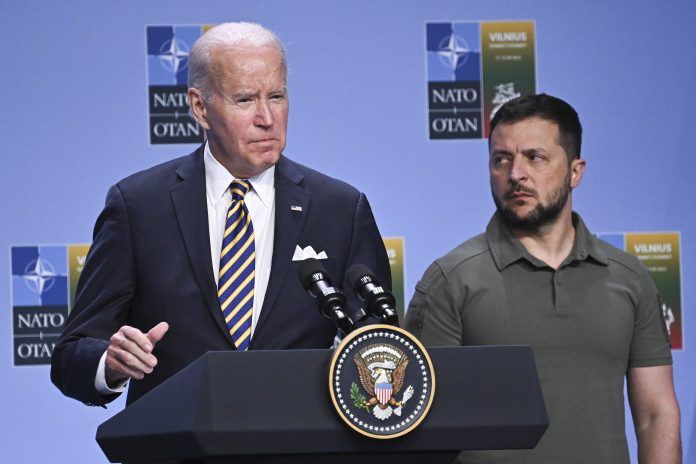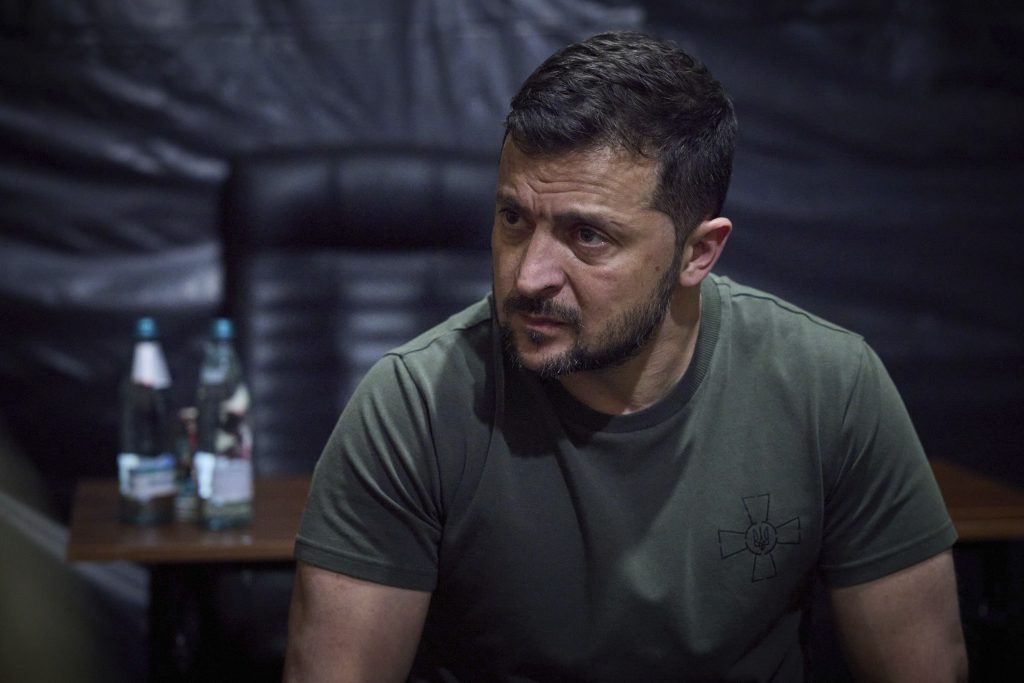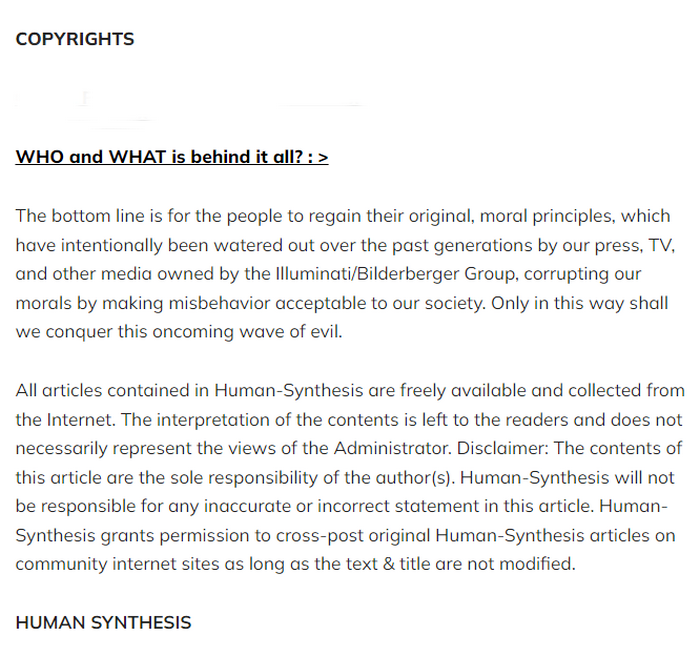Zelenskyj article in TIME causes a stir: Tired, isolated, losing grip

By inyheter - Helge Lurås - Responsible editor - 3 November 2023
Simon Shuster from TIME Magazine has been allowed to accompany Volodymyr Zelenskyj back to Ukraine after his visit to Washington at the end of September. There, he has spoken to several close advisers, who speak anonymously. The picture drawn in an article published on October 30 has caused anger against TIME in Ukraine.
But it is not only Zelenskyj and the challenges on the battlefield in Ukraine that the article paints a gloomy picture of. The president's frustration stems not least from the rapidly declining willingness in the West, not least in the United States, to support his calls for more support.
“Nobody believes in victory like I do. No one," Zelenskyj tells TIME after the trip to the United States. Convincing the Allies that victory is possible, he said, “takes all your power, your energy. You understand? It takes so much of everything.”
We remember the reception Zelenskyj received in the West in the days, weeks and months after Russia's invasion on February 24, 2022. He spoke on the big screen in parliament after parliament, to standing ovations and promises of full support for a war that Ukraine allegedly fought for the freedom of all of Europe . Private individuals changed their profile pictures on social media with Ukrainian flags, young men volunteered and went to Ukraine, people collected equipment and transported it in lorries to Ukraine.
But not now anymore. The contrast in Washington is particularly marked. In December 2022, he was picked up by plane and fighter jet escort in Poland and flown to Washington, where he received a "hero's welcome" and, something that rarely happens to a foreigner, gave a speech in Congress in the United States. Along the way, the elected representatives rose "more than 13 times until I stopped counting," writes Shuster, who was present. Zelenkyj declared that they had "defeated Russia in terms of world opinion".
This time his advisers asked that he be allowed to speak, but this was refused. He had a brief private meeting with then speaker Kevin McCarthy before he was allowed to meet elected officials behind closed doors. Tez Cruz strolled in 20 minutes late. Democrats wanted to know how badly the war was really going and what would happen if the US cut aid. "What happens is that we lose," Zelenskyy replied. "You sacrifice money, we sacrifice life," he continued.
But it didn't help. In mid-October, Joe Biden sent a request for a new 61 billion dollars to Ukraine . The money has still not been approved. A growing proportion of Republicans are against it. Biden is now trying to link monetary support to Israel with Ukraine support in recognition that Ukraine alone is not considered a good enough cause.
The contrast to the promises in 2022 is palpable. Nor do the media want to know about Zelenskyj. The advisers tried to get him on a one-on-one interview on Fox News and as a guest on Oprah Winfrey. It didn't work either. Only 41% of Americans now favor further arms deliveries to Ukraine, down from 65% in June.
And the rejection characterizes Zelenskyj, writes TIME. After a meeting with Biden at the White House where he was to present awards, he was unable to stay focused or inject any kind of energy into his speech. Zelenskyj returned to Kyiv empty-handed and rejected. Simon Shuster I asked a member of Zelenksy's circle how the president was doing. The answer came without a second's hesitation: "Angry."
The usual spark of his optimism, his sense of humour, his tendency to liven up a War Cabinet meeting with a bit of banter or a silly joke, none of this has survived into the second year of total war.
"Now he walks in, gets the updates, gives the orders and walks out," says a longtime member of his team. Another said that Zelenskyj, most of all, feels betrayed by his Western allies. They have left him without the means to win the war, only the means to survive it.
But Zelenksyj's own convictions reportedly have not changed. Despite the latest setbacks on the battlefield, he has no intention of giving up the fight or seeking a negotiated peace settlement.
On the contrary, his belief in Ukraine's eventual victory over Russia has hardened into a form that worries some of his advisers, writes TIME. It is motionless, bordering on the messianic. "He's fooling himself," says one of his closest aides in frustration. "We are out of options. We don't win. But try telling him that.”
Zelenskyi's stubbornness, some of his aides say, has hurt his team's efforts to come up with a new strategy, a new message. While they have discussed the future of the war, one question has remained taboo: the possibility of negotiating a peace treaty with the Russians.
The president is trying to convince allies that Putin must be stopped in Ukraine, otherwise the aggression will continue to other countries, he claims, but to less and less attention.
And now the war in Gaza and Israel's challenges have arrived and are taking attention away from Ukraine. After October 7, Zelenskyj tried to invite himself to Israel, but was politely rejected that the time was not right.
Ukraine is trying to increase production of weapons it can use itself, fearing that supplies from the West will decrease, such as drones. But they lack not only material, but also soldiers. No one will reveal how many have been killed and wounded, but the army has to use increasingly invasive measures to enlist soldiers.
The cold will also make military advances even more difficult, locking up the front lines at least until spring. But Zelensky has refused to accept it. "For me, freezing the war means losing it," he says. Before winter sets in, his advisor warned to expect major changes in their military strategy and a major shakeup in the president's team.
At least one minister must be fired, along with a senior general in charge of the counteroffensive, they said, to hold someone accountable for Ukraine's slow progress on the front. "We are not moving forward," says one of Zelensky's close aides.
Stopped listening to Zelenskyj
Some front-line commanders have begun refusing orders to advance, even when they came directly from the president's office. "They just want to sit in the trenches and hold the line," he says. "But we can't win a war that way."
At one point in early October, an unnamed senior officer said, the political leadership in Kyiv demanded an operation to "recapture" the city of Horlivka, a strategic outpost in eastern Ukraine that the Russians have held and fiercely defended for nearly a decade. The answer came back in the form of a question: With what? "They don't have the men or the guns," says the officer. “Where are the weapons? Where's the artillery? Where are the new recruits?”
In some branches of the military, the shortage of personnel has become even more serious than the deficit of weapons and ammunition. One of Zelenskyi's close aides says that even if the US and its allies come through with all the weapons they have promised, "we don't have the men to use them."

More than 100,000 Ukrainian soldiers have been killed or seriously wounded, Western intelligence services believe. When the war started, over 100,000 recruits signed up in the first 10 days. Optimistically, it was believed that the war would be won quickly. Instead, the casualty figures are high and the front lines are barely moving. Now the number of volunteers has dried up. Stories abound on social media about people being picked up on trains and buses and sent straight to the front. People can bribe their way out.
The average age of the fighting soldiers is now a whopping 43 years. And as it is pointed out, health in Ukraine is not like in the West. It looks very bad.
Russia has attacked energy supplies in the past, and new rounds are expected in the winter. Three senior officials responsible for dealing with this problem told TIME that blackouts would likely become more severe this winter, and the public reaction in Ukraine would not be as forgiving. "Last year, people blamed the Russians," says one of them. "This time they will blame us for not doing enough to prepare."
Corruption
In recent months, the issue of corruption has strained Zelenskyi's relationship with many of his allies. Ahead of his visit to Washington, the White House drew up a list of anti-corruption reforms that Ukrainians could implement. One of the aides who traveled with Zelenskyj to the US said that these proposals were aimed at the top of the state hierarchy. "This was not a proposal," says another presidential adviser. - This was a requirement.
To address American concerns, Zelenskyi took some dramatic steps. In early September, he fired his defense minister, Oleksiy Reznikov, a member of his inner circle who had been investigated for corruption in his ministry. Two presidential advisers said that he had not been personally involved in corruption. "But he couldn't keep his ministry in order," says one, pointing to the high prices the ministry paid for supplies, such as winter coats for soldiers and eggs to keep them fed.
As news of these scandals spread, the president issued strict orders to his staff to avoid the slightest perception of self-enrichment. "Don't buy anything. Don't take any vacations. Just sit at your desk, be quiet and work,” says one employee, characterizing these directives. Some mid-level officials in the administration complained of bureaucratic paralysis and low morale as scrutiny of their work intensified.
The typical salary in the president's office is about $1,000 per month, or about $1,500 for senior officials, far less than they could earn in the private sector. "We sleep in rooms that are 2 by 3 meters," about the size of a prison cell, says Andriy Yermak, the president's chief of staff, referring to the bunker that Zelenskyj and some of his confidants have called home since the start of the invasion. "We're not out here living the high life," he says. "All day, every day, we are busy fighting this war."
The TIMEs journalist writes that he assumed that officials in Ukraine would think twice before taking bribes since so much attention was on the topic. But when he said this to a senior presidential adviser in early October, he asked Shuster to turn off his tape recorder so he could speak more freely. "Simon, you're wrong," he says. "People steal like there's no tomorrow."
Even the firing of the defense minister did not make officials "feel any fear," he added, because the purge took too long to materialize.
The president was warned in February that corruption had grown in the ministry, but he held off for more than six months, giving his allies several chances to deal with the problems quietly or explain them away. When he acted ahead of the visit to the United States, "it was too late," says another senior presidential adviser. Ukraine's Western allies were already aware of the scandal by then. Soldiers at the front had started making harmless jokes about "Reznikov's egg", a new metaphor for corruption. "The reputational damage was done," says the adviser.
Tired and "out of touch"
To begin with, Volodymyr Zelenskyj was compared to Winston Churchill in his ability to mobilize for war effort. But the former actor has been given his most difficult role, we are to believe the article in TIME. It describes a war that has stagnated, allies that have grown weary, and his own advisers and soldiers who have lost faith in him, and that victory is within reasonable reach.
"I don't think Ukraine can afford to get tired of the war," concludes Zelenskyj. "Least of all the president himself".
Reactions
The article has sent shock waves into Ukraine.
- It feels difficult as Ukrainians to read misleading articles that ignore our voice. After two years of war and decades of struggle against Russian colonialism, the American media still seem to believe that it is Moscow and Washington that decide the fate of Ukraine, not us Ukrainians, writes Tymofij Mylovanov at X. He is the rector of the Kyiv School of Economics and advisor for Zelenskyi.

From news - Helge Lurås - Responsible editor
